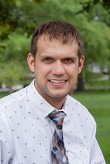
History professor Caleb Owen received his Ph.D. in history at Michigan State University after graduating with a B.A. from Oregon University. Though he completed some assistant teaching work as a graduate student at Michigan State University, this is Owen’s first year as a full time instructor.
What courses do you teach at Truman State University?
Early world history — HIST111 for the nonmajors, HIST211 for the major students.
In addition, I am teaching modern African history, since 1800, and next semester I am planning to offer the counterpart to that course, which looks at Africa prior to 1800, or prior to the start of colonial Africa.
What sparked your interest in history, particularly African history?
I got interested in history generally through interest in sources and looking at the sources and trying to play the role of detective and understand how it can inform me about understanding the past. I took the AP courses in high school, and the document interpretation side was the part of those courses that I got the most out of. However, when I started my undergraduate education at the university, I just decided to be a little bit bold in that I had already taken U.S. history and European history, so I wanted to get to know a new side of the world that people have less knowledge about. I think that in taking these African history courses, I really moved towards just getting to learn about African societies and beginning to interact with both African written sources but as well as African people and their perspectives and kind of learning how Africans had a role in shaping their own histories — that they weren’t these helpless victims who suffered oppression, poverty and disease and all those things that we read about in popular newspapers and magazines. Rather, they have rich, dynamic cultures with very deep histories and have had a lot of impactful contributions to the world.
Did you study abroad to Africa?
My first year of undergraduate I had the opportunity to go to Mexico and continue Spanish, but that was another phase of my life. But, in terms of Africa, it really was cemented through having an opportunity to study in Kenya for a semester. We were on the coast of Kenya, and our program allowed us to do our own independent research project. I did mine on looking at a popular form of music and how it changed over time. It was the time of my life — interacting with various musicians, hanging out with musicians, attending concerts — also, just meeting people, experiencing the food and the culture and building these connections.
Tell me what drew you into coming to Kirksville to teach at Truman.
A couple of things stood out about the town. First of all, I was very impressed by the opportunities for faculty and student engagement and that the classes tended to have a lot of discussion, and that the faculty had a good rapport with the students, and that’s something that I kind of want to develop myself as a teacher, so that was a significant draw. I was also excited for the opportunity to help contribute to building interest and knowledge around African studies in that Kirksville actually has a significant African population in the area, and so I think African studies is a much-needed field at any university, but I think it has particular possibilities for community connections here in Kirksville.
So far, what have you learned about Truman?
I think it’s adjusting and learning more about how a liberal arts college operates. I guess it’s not a really simple way to say this, but I came from a big research institution, and so it was a big emphasis on research and students were at the bottom end of the university totem pole in many respects. In this university, I think students have been really central as to how faculty think about and contextualize their research, so that has given me new possibilities to kind of think about my own position as a scholar and as a teacher.
After your first few months, what do you like about teaching at Truman?
I think one of the things is that the students here are curious and that’s something that has been very impressive to me about the courses. They ask really thoughtful questions about stuff they don’t understand or things that are new to them — they’re not afraid to ask questions. They’re also not afraid to jump in and to try to address or try to pull from what I think are possibly challenging readings and challenging materials in the sense that it’s not stuff that most people aren’t exposed to every day.
What do you want students and others in the community to know about you?
I think, generally, I’m happy to be in Kirksville and I think one of the things I’m looking forward to is building relationship and dialogue within the University and the outside community, particularly the African community here, as well as trying to look at how students can connect to this small town we’re all living in.
This appeared in the Sept. 15 issue of the Index.
